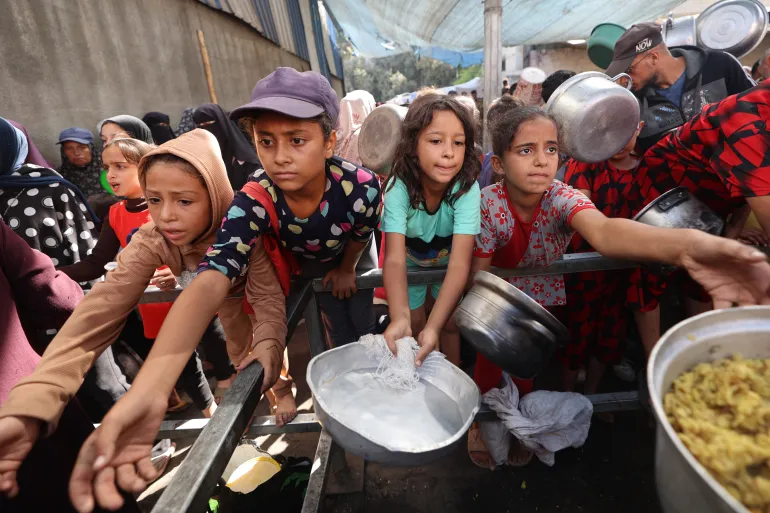
GAZA CITY – October 23, 2025 — The humanitarian situation in Gaza remains dire despite a two-week-old ceasefire, with the World Health Organization (WHO) warning that the enclave’s hunger crisis is still “catastrophic.” Aid groups say Israel continues to block or restrict essential aid shipments, leaving millions of Palestinians at risk of starvation.
“The situation still remains catastrophic because what’s entering is not enough,” said WHO Director-General Tedros Adhanom Ghebreyesus. “There is no dent in hunger because there is not enough food.”
According to the UN World Food Programme (WFP), Gaza needs 2,000 tonnes of aid per day to meet basic nutritional requirements. But only around 750 tonnes are entering daily — less than half the target — because only two crossings under Israeli control remain open: Karem Abu Salem (Kerem Shalom) in the south and al-Karara (Kissufim) in central Gaza.
Widespread Starvation and Malnutrition
The UN estimates that one in four Gazans — including 11,500 pregnant women — is currently starving. Malnutrition rates among newborns have soared: 70% of babies are now premature or underweight, compared with 20% before October 2023, according to Andrew Saberton, deputy executive director of the UN Population Fund (UNFPA).
“Malnutrition will have generational effects,” Saberton warned. “These babies will likely face long-term health and developmental challenges.”
The Integrated Food Security Phase Classification (IPC) declared a famine in Gaza City and surrounding areas in August, estimating that over 500,000 people faced “catastrophic conditions.”
Aid Blockages and Escalating Costs
Local aid workers say restrictions are worsening the situation. Bahaa Zaqout, director of external relations at the Palestinian Agricultural Relief Committees (PARC), said that while commercial goods such as biscuits, soda, and chocolate have been allowed in, essential food items and seeds remain blocked.
“These do not meet even the minimum nutritional needs for children and vulnerable groups,” Zaqout said.
Food prices have skyrocketed. One kilogram of tomatoes, which used to cost 1 shekel, now costs 15 shekels ($4.50) — far beyond what most families can afford.
Aid Groups Accuse Israel of Blocking Deliveries
In an open letter signed by 41 international organizations, including Oxfam and the Norwegian Refugee Council, aid groups accused Israel of “arbitrarily rejecting” humanitarian aid shipments during the ceasefire period.
Between October 10 and 21, Israel reportedly rejected 99 requests from international NGOs and denied six UN aid requests, blocking the entry of food, blankets, hygiene kits, tents, and children’s clothing — all items deemed “essential and unrestricted” under international law.
“Supplies are packaged, staff are equipped and ready to respond at scale,” the letter stated. “What we need now is access.”
ICJ Ruling and Legal Pressure
On Wednesday, the International Court of Justice (ICJ) ruled that Israel must ensure the basic needs of Gaza’s population are met, reaffirming obligations under international humanitarian law.
In April, UN lawyers accused Israel of violating those laws by restricting aid between March and May. Despite the ceasefire, humanitarian organizations argue that Israel has failed to meet its legal responsibilities, with access still tightly limited.
A Humanitarian Disaster with No End in Sight
The war, which began with Hamas’s October 7, 2023, attack that killed 1,139 people in Israel and led to the capture of more than 200 hostages, has devastated Gaza. Since then, at least 68,280 Palestinians have been killed and 170,375 wounded, according to Gaza’s Health Ministry.
The WHO and partner agencies warn that, even with the ceasefire, Gaza’s health and food systems are collapsing, and that unless full-scale humanitarian access is restored, the famine will deepen.
“We have the supplies, the capacity, and the will,” WHO’s Tedros said. “What’s missing is access — and every day of delay costs more lives.”


Leave a Reply